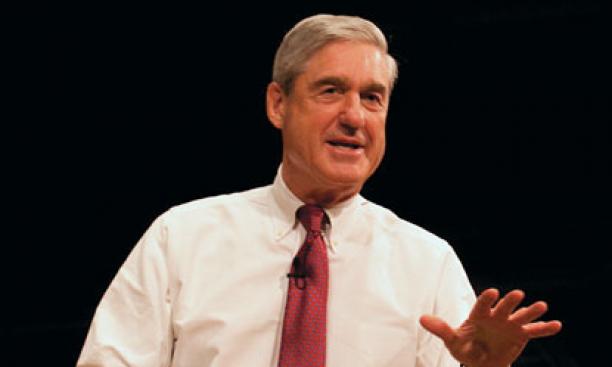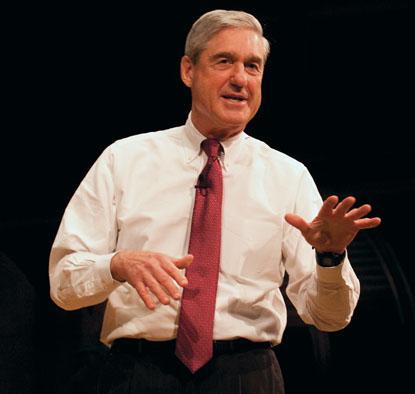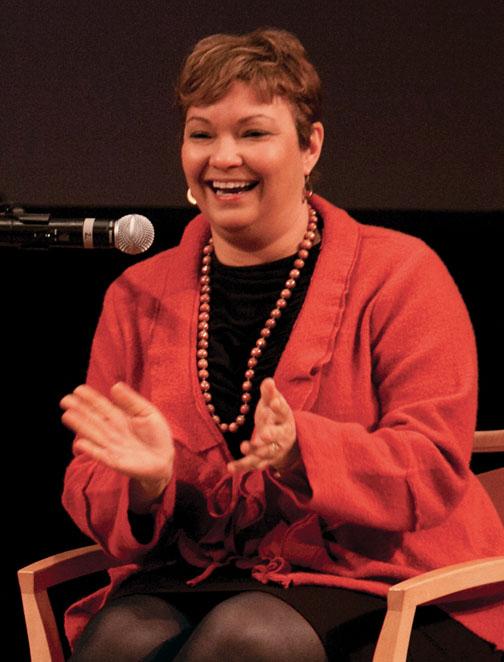


Each of Alumni Day’s top alumni honorees dreamed of becoming a doctor, but FBI director Robert Mueller III ’66 and Environmental Protection Agency administrator Lisa P. Jackson *86 ended up on very different paths. In campus addresses Feb. 25, they talked about how formative experiences at Princeton and elsewhere reshaped their career paths and led to leadership of government agencies.
(This is a corrected version of an article published in the March 21, 2012, issue. The correction appears at the end of the story.)
For Mueller, the Woodrow Wilson Award winner, a difficult Princeton class on organic chemistry derailed his plans for a medical career, he said. He earned his bachelor’s degree in politics instead. But it was the death of David Hackett ’65 on a Vietnam battlefield that helped set Mueller on the path to public service, he explained. Hackett and Mueller played together on Princeton’s lacrosse team.
“One would have thought that the life of a Marine, and David’s death in Vietnam, would argue strongly against following in his footsteps. But many of us saw in him the person we wanted to be,” Mueller said. “And a number of his friends, teammates, and associates joined the Marine Corps because of him, as did I. ... He taught us the true meaning of leadership. One teammate can change your life. And David Hackett changed mine.”
Mueller spent one year in Vietnam as the leader of an infantry platoon, receiving the Bronze Star and the Purple Heart for his service.
In a talk mainly focusing on Princeton’s role in his life, Mueller also spoke of Princeton classmate W. Lee Rawls ’66, who had been his close adviser at the FBI before Rawls’ death in 2010. Mueller, director of the FBI since 2001, credited Rawls with keeping him grounded and giving him “some confidence that I might actually be able to survive this job.”
“Lee’s innate sense of humility — the idea that the world does not revolve around you — was central to his character,” Mueller said. “And it’s that same sense of humility — that constant reminder of one’s place in the grand scheme of things, that sense of being in the world and of this world — that is part of the Princeton tradition.”
During a question-and-answer session, Mueller discussed the evolution of his leadership style by citing a briefing he gave President George W. Bush soon after the Sept. 11 terrorist attacks. Bush cut him off about two minutes into the briefing, Mueller said.
“President Bush says, ‘Look, Bob — stop. What you’re telling me is what you do after an attack. What I want to know is what you’re doing to stop the next attack.’ It was like being a high school student coming in with the wrong assignment.” Mueller has been focusing on prevention ever since.
The morning lectures by Mueller and Jackson, held in Richardson Auditorium, were among the events that drew about 1,150 alumni and family members to campus. Lecture topics ranged from AIDS in Africa to children’s literature in a digital age. Alumni recalled deceased friends and teachers at the Service of Remembrance, and honored volunteers at the annual luncheon at Jadwin Gym. The student winners of the Jacobus Fellowships and the Pyne Honor Prize were recognized and gave brief remarks.
Jackson, who won the James Madison Medal, spoke about being one of the few women in Princeton’s chemical engineering graduate program when she earned a master’s degree in 1986. Her interest in science and math, she said, began with a calculator that she received at an engineering summer camp, and was fueled by attending an all-girls’ high school. “The qualities that have traditionally discouraged young women from pursuing science — that we are not interested in a cold and hard and disconnected discipline — are a misrepresentation of both women and science,” she said.
She initially wanted to be a doctor “because I wanted to help people by treating them when they got sick. I came to realize that if I studied chemical engineering, and started working to protect our environment, I could help people by making sure they didn’t get sick in the first place.” Studying at Princeton “set the trajectory for my entire life,” she said. “This university is where I had the opportunity to fully immerse myself in what became one of the greatest passions of my life — the exploration of science.”
Her mother, however, still wanted Jackson to be a doctor. “For years she asked me why in the world I took up environmental protection,” Jackson said. “But she stopped asking me that once President Obama called” and she became EPA administrator in 2009. Jackson is the first African-American and the third Princeton graduate to hold the office.
Jackson discussed the importance of attracting more women to the field of science. “We have to be diligent about the subtle but pervasive discouragement women can encounter when they think about taking a computer science class, or want to learn more about physics, or consider a career in robotics,” she said. “We must change the perception that science is a man’s field.”
For the record
An earlier version of this story misstated the length of Mueller’s service in Vietnam. He was in the Marines for three years and in Vietnam for one.

